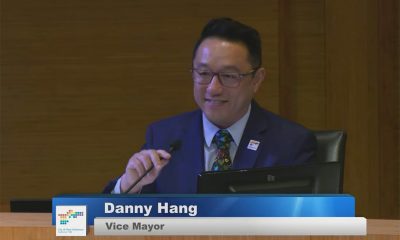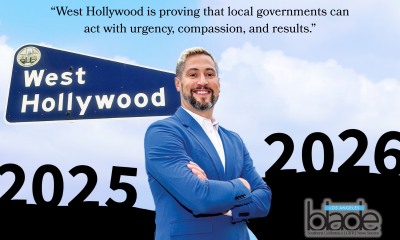West Hollywood
West Hollywood in brief- City government in action this week
Women’s History Month; Getting Out the Vote; Strategic Plan Open House; Temp Closure of Sections of WeHo Park; plus more
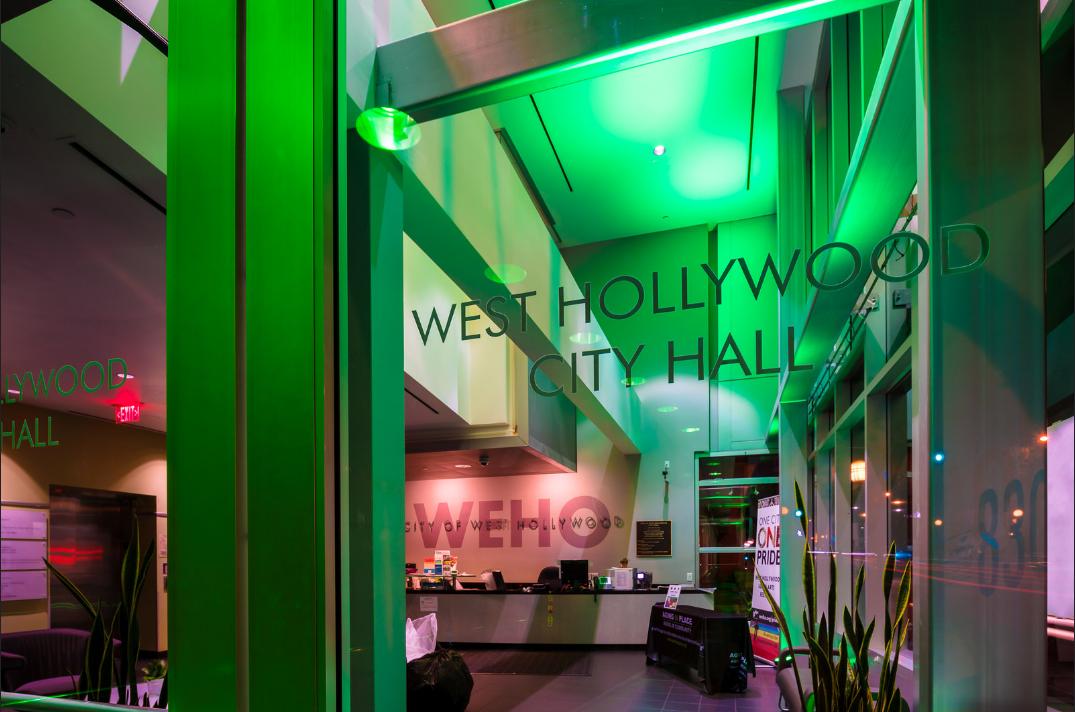
City of West Hollywood Celebrates Women’s History Month in March
WEST HOLLYWOOD – The City of West Hollywood will celebrate National Women’s History Month in March with a series of events to recognize and honor women and women’s history.
The City’s National Women’s History Month events will officially kick-off with the unveiling of two new women’s history month street pole banners honoring two notable women: transgender pioneer Marsha P. Johnson, one of the most prominent figures of the gay rights movement of the 1960s and 1970s and whose legacy continues to this day; and country music legend and actor Dolly Parton. The street pole banners presentation will take place at the regular meeting of the West Hollywood City Council on Monday, March 4, 2024 at 6 p.m. at the City of West Hollywood’s Council Chambers/Public Meeting Room, located at 625 N. San Vicente Boulevard, adjacent to the West Hollywood Library. Attendance is free; no RSVP is required. Limited validated parking will be available at the adjacent five-story structure. The City Council meeting broadcast will be available for viewing on the City’s website by visiting www.weho.org/wehotv or on the City’s WeHoTV YouTube channel at www.youtube.com/wehotv.
From Tuesday, March 5, 2024 through Friday, March 22, 2024, the globe lanterns above Santa Monica Boulevard will glow purple and gold. Throughout the month, a series of street pole banners that commemorate famous American women, civil rights leaders, and women’s rights activists will be on display along Santa Monica Boulevard. The City’s featured banners include: Gail Abarbanel; Maya Angelou; Ivy Bottini; Hillary Rodham Clinton; Midge Costanza; Marion Wright Edelman; Alicia Garza; Barbara Gittings; Dolores Huerta; Coretta Scott King; Wilma Mankiller; Michaela Mendelsohn; Patsy Mink; Zoe Nicholson; Connie Norman; Michelle Obama; Rosa Parks; Mary Pickford; Sonia Sotomayor; Nadia Sutton; Gloria Steinem; Elizabeth Taylor; Ruth Williams; Oprah Winfrey; among others. This year’s additions to the Women’s History Month banners are Marsha P. Johnson and Dolly Parton.
The City of West Hollywood and its Russian-Speaking Advisory Board will host a free program celebrating International Women’s Day on Sunday, March 3, 2024 from 12 p.m. to 3 p.m. at the Plummer Park Community Center, rooms 5 & 6, located at 7377 Santa Monica Boulevard. The celebration will feature music, food, dancing, and a fashion show. For additional information call (323) 848-6826 or email [email protected].
Supported by the City of West Hollywood, the first annual Sexual Healing/Sexual Health Ladies’ Brunch is a sex-positive and age-positive experience to learn more about women’s reproductive and mental health, menopause, and sexual pleasure. The brunch will be held on Sunday, March 3, 2024 from 11 a.m. to 2:30 p.m. at The Pleasure Chest and Hind Lounge located at 7733 Santa Monica Boulevard. This event is presented in partnership with The Pleasure Chest and Hind Bar and supported by the City of West Hollywood and its Women’s Advisory Board and the West Hollywood Chamber of Commerce. Tickets are $45 and available for purchase both online at https://www.eventbrite.com/e/sexual-healingsexual-healthtickets-823196401597 and at the door. For additional information email [email protected]
Also on Sunday, March 3, 2024 the City of West Hollywood and its Women’s Advisory Board will co-sponsor Guaranteed Abundance: Guaranteed Income Advocacy Training presented by LA Voice and the National Council of Jewish Women Los Angeles to be held from 10 a.m. to 11:30 a.m. at the West Hollywood Library Community Meeting Room located at 625 N. San Vicente Boulevard. Admission is free. To register visit bit.ly/GBIAdvocacy. For additional information email [email protected].
There will be a viewing party with artist Shaghayegh Cyrous to watch the moving image artwork, Xvarnah, on the digital billboard (Streamlined Arbor) at 9157 Sunset Boulevard on Sunday, March 3, 2024 from 1 p.m. to 2:30 p.m. Artwork airs every 20 minutes beginning at the top of the hour. Admission is free. This project is presented as part of the West Hollywood Moving Image Media Art Program (MIMA), an exhibition series administered by the City’s Arts Division, as part of its Art on the Outside program, and is presented with the City’s Sunset Arts and Advertising Program. Xvarnah will be on display through Thursday, May 30, 2024.
Women and Books is a book club that meets on the first Tuesday of each month to discuss books written by women authors. On Tuesday, March 5, 2024 from 7 p.m. to 8 p.m. the group will discuss The Paris Bookseller by Kerri Maher. Women and Books is co-sponsored by the City of West Hollywood through its Women’s Advisory Board and by West Hollywood Library. Admission is free. This is a hybrid event and will be hosted in-person at the West Hollywood Library’s Ruth Bader Ginsburg Room, located at 625 N. San Vicente Boulevard, as well as virtually on Zoom. To register, visit: https://lacountylibrary.webex.com/lacountylibrary/j.php?MTID=maa8a00d769f8b023cc81d2d603b7184c.
MashUp Contemporary Dance Company’s annual International Women’s Day Dance Festival will kick-off in West Hollywood on Friday, March 8, 2024 with the LA Women in Dance Summit in WeHo from 9 a.m. to 2 p.m. at Plummer Park’s Great Hall, located at 7377 Santa Monica Boulevard. The event will feature guest speakers, master classes and an Industry Expo. Tickets prices range from $20 to $65. To register and find out more about the entire festival, visit: https://www.mashupdance.com/tickets/international-womens-day-dance-festival. This project is supported in part by a grant from the City of West Hollywood.
The City of West Hollywood and its Women’s Advisory Board will co-sponsor the Annual Herstory Awards & Reception, which is presented by the Hollywood Chapter of the National Organization for Women (Hollywood NOW) to honor a woman who has made exceptional contributions to the community and embodies the spirit of feminism. This year’s honoree is Abbe Land, former West Hollywood Mayor and City Councilmember. The event will take place on Wednesday, March 13, 2024 at 7 p.m. at the West Hollywood Library Community Meeting Room, located at 625 N. San Vicente Boulevard. Admission is free. To RSVP, visit https://www.eventbrite.com/e/849689954527?aff=oddtdtcreator.
The City and its Women’s Advisory Board will host the Women’s History Month Party to honor the contributions of women and the more than 30 years of service of the City’s Women’s Advisory Board on Friday, March 15, 2024 from 7 p.m. to 10 p.m. at the West Hollywood City Council Chambers/Public Meeting Room and Auto Court, located at 625 N. San Vicente Boulevard. Admission is free, RSVP is requested by visiting www.weho.org/whm.
On Wednesday, March 27, 2024, from 6 p.m. to 8 p.m., the 27th Annual West Hollywood Women in Leadership Awards and Reception will take place at the Andaz West Hollywood, located at 8401 Sunset Boulevard. The event is co-sponsored by the City of West Hollywood and its Women’s Advisory Board along with the West Hollywood Chamber of Commerce. Admission is $25 and proceeds will benefit the Rape Treatment Center at UCLA Santa Monica Medical Center. To RSVP visit www.weho.org/whm.
A full schedule of City of West Hollywood events and meetings is available at www.weho.org/calendar.For more information about Women’s History Month in the City of West Hollywood, please contact Larissa Fooks, the City of West Hollywood’s Community Programs Coordinator, at (323) 848-6413 or at [email protected].
For people who are Deaf or hard of hearing, please call TTY (323) 848-6496.
City of West Hollywood’s Human Rights Speakers Series Presents a Free Screening & Panel Discussion of ‘Freedom on Fire: Ukraine’s Fight for Freedom’
To recognize the tenth anniversary of the war and the second anniversary of the full-scale invasion of Ukraine, the City of West Hollywood’s Human Rights Speakers Series will host a screening of the award-winning documentary film Freedom on Fire: Ukraine’s Fight for Freedom followed by a panel discussion featuring Emmy- and Oscar-nominated director/producer Evgeny Afineevsky and Anna Zaitseva, film protagonist, activist and survivor. Crafted from stark footage and exclusive interviews with people displaced by the enduring conflict, Freedom on Fire reveals how the spirit of unity strengthens morale even amid the country’s darkest hours.
The event will take place on Tuesday, March 19, 2024, at the City of West Hollywood’s Council Chambers/Public Meeting Room, located at 625 N. San Vicente Boulevard, adjacent to the West Hollywood Library. Doors will open at 6 p.m. and opening remarks will take place at 6:30 p.m., followed by the film screening and panel discussion. The event is free, but seating is limited. RSVP is required at http://go.weho.org/hrss.
The City of West Hollywood’s Human Rights Speakers Series brings together diverse communities to learn about and discuss global, national, and local human rights issues in a supportive environment. The series reflects the City’s commitment to human rights and core value of Respect and Support for People.
For additional information about the Human Rights Speakers Series, please visit www.weho.org/hrss.For more information, please contact Joy Tribble, the City of West Hollywood’s Arts Specialist, at (323) 848-6360 or at [email protected]. For people who are Deaf or hard of hearing, please call TTY (323) 848-6496.
2024 Public Safety Awards & Luncheon
The City of West Hollywood invites community members to attend the 2024 Public Safety Awards & Luncheon as the City celebrates and recognizes its organizational partners in public safety organizations that have made significant efforts towards enhancing community safety in West Hollywood.
The Public Safety Awards & Luncheon will take place on Wednesday, March 6, 2024, at 11:30 a.m. at the City of West Hollywood’s Council Chambers/Public Meeting Room, located at 625 N. San Vicente Boulevard. Lunch will be served in the Auto Court area outside the Chambers followed by the awards presentation inside. Admission is free; no RSVP is required. Parking will be available in the adjacent five-story structure, accessible from the El Tovar Place entrance off N. Robertson Boulevard.
This year, the Public Safety Awards will be presented to members of the Los Angeles County Sheriff’s Department West Hollywood Station, Los Angeles County Fire Department Stations 7 and 8, and to West Hollywood Block by Block Security Ambassadors.
These award recipients have made extraordinary efforts in public safety programs and events, strengthened community partnerships; and have demonstrated leadership in multiple ways that have contributed to a safer community.For more information about the City’s Public Safety Awards & Luncheon, please contact Anita Shandi, the City of West Hollywood’s Public Safety Manager, at [email protected] or at (323) 848-6446. For people who are Deaf or hard of hearing, please call TTY (323) 848-6496.
Temporary Closure of Sections of West Hollywood Park will Take Place in February/March to Accommodate Special Event
From Wednesday, February 28, 2024, to Thursday, March 14, 2024, there will be a temporary closure of certain sections of West Hollywood Park, located at 647 N. San Vicente Boulevard – including the small dog park and basketball courts – to accommodate the annual Elton John AIDS Foundation Academy Awards Viewing Party and fundraiser.
Additionally, there will be intermittent lane closures on N. San Vicente Boulevard, one full street closure, and impacts to certain West Hollywood Park facilities, as follows:
Intermittent lane closures will occur on Southbound N. San Vicente Boulevard between Santa Monica Boulevard and PDC Drive on the following dates:
- Friday, March 1, 2024 – Southbound N. San Vicente Boulevard #1 & #2 lanes will be closed from 5 a.m. to 10 a.m.;
- Saturday, March 2, 2024 – Southbound N. San Vicente Boulevard #1 & #2 lanes will be closed from 6 a.m. to 11 a.m.;
- Monday, March 4, 2024, through Thursday, March 7, 2024 (Daily) – Southbound N. San Vicente Boulevard #2 lane will be closed from 8 a.m. to 5 p.m.;
- Friday, March 8, 2024, through March 10, 2024 – Southbound N. San Vicente Boulevard #2 lane will be closed from 6:30 a.m. to 12 p.m.;
- Monday, March 11, 2024 – Southbound N. San Vicente Boulevard #2 lane will be closed from 5 a.m. to 10 p.m.; and Southbound N. San Vicente Boulevard #1 lane will be closed from 6 p.m. to 10 p.m.;
- Tuesday, March 12, 2024 – Southbound N. San Vicente Boulevard #1 & and #2 lanes will be closed from 6 p.m. to 10 p.m.
A full street closure will occur on Northbound and Southbound N. San Vicente Boulevard between Santa Monica Boulevard and Melrose Avenue starting on Sunday, March 10, 2024, at 12 p.m.; the street will reopen on Monday, March 11, 2024, at 5 a.m.
West Hollywood Park facilities impacts/closures will occur as follows:
- West Hollywood Park small dog park and basketball courts will be closed from Wednesday, February 28, 2024, through Wednesday, March 13, 2024; and
- West Hollywood Park large dog park will be closed from Friday, March 8, 2024, through Monday, March 11, 2024;
- West Hollywood Park Five-Story Parking Structure will be closed all day on Sunday, March 10, 2024; the structure will reopen on Monday, March 11, 2024, at 5 a.m.
The City of West Hollywood has proudly supported the work of the Elton John AIDS Foundation and its Academy Awards Viewing Party over many years. This year marks the 32nd anniversary of the Elton John AIDS Foundation.For inquiries related to the City of West Hollywood and temporary impacts on West Hollywood Park, please contact the City of West Hollywood’s Event Services Division at [email protected]. For people who are Deaf or hard of hearing, please call TTY (323) 848-6496.
West Hollywood Invites Community Members to Participate in Upcoming ‘WeHo 40’ Strategic Plan Open House
The City of West Hollywood will host a community open house to kick off the development of West Hollywood’s next citywide strategic plan, WeHo 40. This free event will include a brief program, food, and live entertainment. It will take place on Saturday, March 2, 2024 from 11 a.m. to 2 p.m. at Kings Road Park, located at 1000 N. Kings Road. Community members are encouraged to stop by at any point during the event to learn more about the project, to provide feedback, and to connect with fellow community members. Translation services will be available in Spanish and Russian. Advance RSVP is not required.
This community open house will be the first in a series of community feedback-gathering events, which are central to developing WeHo 40. This event will focus on visioning and goal setting, including the identification of potential goals and priorities. Attendees will have the opportunity to contribute their experiences, ideas, and insightful perspectives to support the development of the strategic plan. The program will include a brief presentation followed by small group discussions and exercises. These activities will be repeated several times over the course of the open house; participants are encouraged to drop in at any time to participate.
WeHo 40 is the City of West Hollywood’s forward-looking strategic planning process. Rooted in 40 years of municipal history – and looking ahead toward 2040 – WeHo 40 will engage residents, community members, and local businesses in setting priorities to create an inclusive and equitable roadmap for the City’s future and build upon the successes of the City’s past strategic plans.
For nearly four decades, the City of West Hollywood has been engaging in the collaborative development of strategic plans in order to shape forward-thinking policies and priorities. The City developed its first strategic plan in 1990. In 2003, the City launched its second strategic plan, Vision 2020. The development of Vision 2020 included the participation of more than 250 community members and helped shape the City’s Mission Statement and Core Values.
Visit engage.weho.org/wehostrategicplan to learn about the latest WeHo 40 updates and sign up for project-specific announcements. For more information, please contact Paolo Kespradit, City of West Hollywood Management Analyst, at (323) 848-6460 or [email protected]. For people who are Deaf or hard of hearing, please call TTY (323) 848-6496.
City of West Hollywood is Getting Out the Vote: Presidential Primary Election Voters May Vote In-Person, Vote by Mail, or Use Ballot Drop-Off Boxes through 8 p.m. on March 5, 2024
As part of the City of West Hollywood’s continuous efforts to increase voter participation, the City reminds community members that each vote counts and your voice matters in the upcoming Presidential Primary Election.
Key Dates for the March 5, 2024 Presidential Primary Election:
- February 1: Vote by Mail begins & Drop Boxes Open
- February 20: Last Day to Register to Vote & Receive a Vote by Mail Ballot
- February 24: Same-Day Registration and 11-Day Vote Centers Open (City of West Hollywood Plummer Park Vote Center, located in Fiesta Hall, 7377 Santa Monica Boulevard)
- March 2: 4-Day Vote Centers Open (City of West Hollywood West Hollywood Park Vote Center, located in the Aquatic and Recreation Center San Vicente/La Cienega Rooms)
- March 5: Election Day
The State of California allows for conditional day-of registration and allows that voter to cast a provisional ballot. Vote by Mail postal mail-in and ballot-drop-off voting for registered voters began on February 1, 2024. Many LA County Vote Centers will begin operating on February 24, 2024; there will be two City of West Hollywood Vote Centers (Plummer Park opens on February 24 and West Hollywood park opens on March 2).
Vote Centers are open every day from 10 a.m. to 7 p.m. during the pre-Election Day voting period. On Election Day, Tuesday, March 5, 2024, Vote Centers will be open from 7 a.m. to 8 p.m. For all LA County Vote Center locations and estimated wait times, visit https://locator.lavote.gov/locations/vc.
The City of West Hollywood provides two free options for residents who need transportation assistance to vote in person at a Vote Center. Cityline makes regular stops at or within a short distance of voting locations. For a route and schedule, visit www.weho.org/cityline. Dial-a-Ride is a rideshare service for West Hollywood residents over 62 or who are living with a disability (of any age) available between 7:30 a.m. and 5 p.m. Monday through Friday by reservation. Advance registration is required; to register, call toll-free (800) 447-2189.
In addition to postal Vote by Mail and in-person voting at Vote Centers for the March 5, 2024 Presidential Primary Election, the City of West Hollywood has worked with LA County to establish three Ballot Drop Box locations in West Hollywood. These Ballot Drop Boxes are bright yellow and clearly marked. They feature safety and security features, such as 24-hour electronic monitoring. Locations are as follows:
- West Hollywood City Hall, located at 8300 Santa Monica Boulevard
(Ballot Drop Box located behind City Hall, off of N. Sweetzer Avenue)
- West Hollywood Library, located at 625 N. San Vicente Boulevard
(Ballot Drop Box located on the west side of the street, in front of the library)
- Plummer Park, located at 7377 Santa Monica Boulevard
(Ballot Drop Box located in front of the Plummer Park Community Center)
The City of West Hollywood encourages every eligible voter to have a vote plan with the following tips:
- Check your voter registration status or register to vote at www.lavote.gov/vrstatus or call (800) 815-2666;
- Decide how you would like to vote: Fill in your ballot and drop off a ballot at a Ballot Drop Box or a Vote Center; or, Vote in-person at a Vote Center;
- Educate yourself about the issues and then vote as soon as you receive your ballot;
- Encourage your friends, family, and neighbors to vote or register to vote;
- Assist those who need help with their mail-in ballot or offer to take a homebound senior to a Vote Center; and
- Track your ballot. You can sign-up to receive personalized text messages, emails, and/or automated voice messages on your Vote-by-Mail ballot (whether sent by mail or dropped off at a Ballot Drop Box or Vote Center) by subscribing to Where’s My Ballot. This is a free service available to all registered voters that provides updated information about where your ballot is and when you can expect to receive it. Sign up to be notified of the status of your ballot at california.ballottrax.net/voter.
City of West Hollywood voters receive complete ballot information by mail directly from the LA County Registrar-Recorder. More election information is available at www.weho.org/elections.
***************************************************************************************
For up-to-date information about City of West Hollywood news and events, follow @wehocity on social media, sign-up for news updates at www.weho.org/email, and visit the City’s calendar of meetings and events at www.weho.org/calendar. West Hollywood City Hall is open for walk-in services at public counters or by appointment by visiting www.weho.org/appointments. City Hall services are accessible by phone at (323) 848-6400 and via website at www.weho.org. Receive text updates by texting “WeHo” to (323) 848-5000.
West Hollywood
John Heilman and Danny Hang will serve as WeHo’s new Mayor and Vice Mayor
Last night, community members and local officials gathered to celebrate new leadership and bid a warm farewell to outgoing Mayor Chelsea Byers.
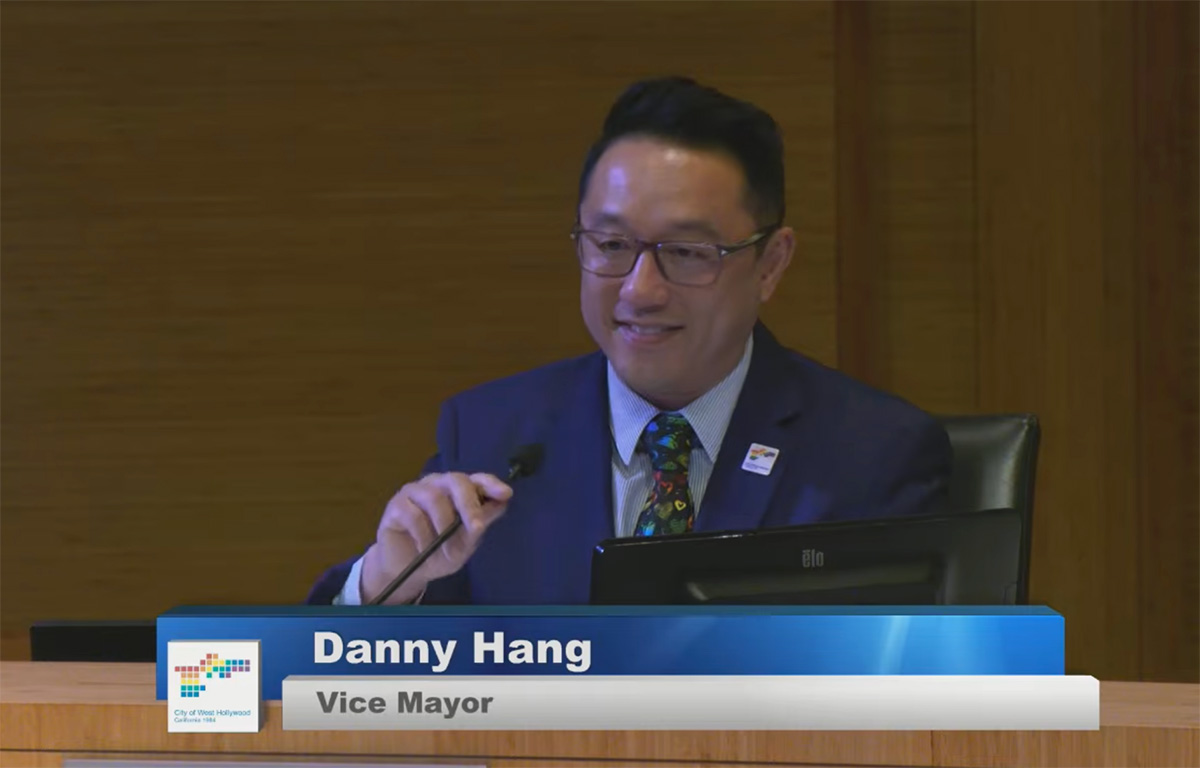
On Jan. 12, West Hollywood residents packed the City’s chambers at 6 p.m. to honor the work of outgoing mayor Chelsea Byers and witness councilmembers John Heilman and Danny Hang take their oath of office as they respectively assume their roles as Mayor and Vice Mayor for 2026.
In her last address as Mayor, Byers spoke about the optimism she holds onto in these unsteady times. To her, West Hollywood is a unique City: one that has become a model for what can be possible in an unjust society. “It’s us against the world. It’s West Hollywood on the stage,” Byers said. “It’s our story to tell, and every single person here contributes in such great ways to that.”
Byers was awarded a plaque on behalf of West Hollywood council members for her outspoken commitment to LGBTQ+ rights, economic justice, housing affordability, and policies that emphasize equity and inclusivity in West Hollywood.
Her leadership remains a bright, guiding light for Mayor Heilman, who was part of West Hollywood’s first city council after the independent city was incorporated in 1984. The spirit of that initial group remains today: queer, progressive, and led for and by the people. Yesterday’s ceremony marked the beginning of Heilman’s ninth time serving as Mayor, as well as his last year on the city council due to term limits.
Now, he leads side-by-side with a self-proclaimed “newcomer,” Danny Hang.
From the 626 to the Westside: Hang’s roots and journey
Hang was born in Monterey Park, a city in the San Gabriel Valley. The region is known for its diverse communities and AAPI-rich culture and history, and Hang recounted to the Blade the deep sense of belonging and comfort he felt growing up there. “I could go to a restaurant, speak Vietnamese or Chinese,” Hang said. “There are people who look like me out there. It is my home away from home.”
After college, he worked at the Social Security Administration, where he helped retirees, disabled people, and those impacted by loss file for Supplemental Security Income (SSI). The work was fulfilling, and he loved feeling that he had a tangible impact on others’ lives: that he could help residents grappling with difficult bureaucratic processes.
This passion grabbed the attention of L.A. County Supervisor Lindsey Horvath, who tapped Hang into serving on West Hollywood’s Disabilities Advisory Board in 2017. Hang eagerly accepted the role, having always been drawn to the vibrant, queer cultural hub. “WeHo was always the land of the unicorn: the land of magic,’ Hang told the Blade. “[This] was a town where I could be open, by myself, and find other people who were also LGBTQ+.”
After serving on the City’s Disabilities Advisory Board and, subsequently, the county’s Business License Commission, Hang noticed a lack of AAPI representation in local leadership. “There aren’t many AAPI people at all in West Hollywood. After I was on the commission, [I thought]: Hey, I think I want to run for city council,” Hang told the Blade.
Creating more inclusive leadership in WeHo
In 2024, Hang was elected to West Hollywood’s city council, becoming the first AAPI councilmember in the City’s 40 year legacy. “I want to see people who look like me in local government, because I want this community to be reflective of the modern-day people who live here. We’re a diverse community, and there’s no reason why we shouldn’t have people of color on the council, as well as more people of color appointed to our boards and commissions.”
Last night, local officials offered encouragement, support, and affirmation to Hang after he took his oath of office. “You’re already making history and certainly making waves across, not just your home region of the San Gabriel Valley, but certainly in California,” said Monterey Park councilmember Henry Lo.
Afterwards, Hang addressed the room, thanking residents, fellow council members and his family. “Standing here as the first AAPI elected to the West Hollywood City Council is deeply meaningful, and I couldn’t have done it without my parents. [They’re] right here in the front row,” Hang said. “My dad was a union worker, who showed me why standing up for workers matters. And my mom worked in a small business, owning a little nail salon in South Pasadena. She taught me what it means to care for others and to keep the community going.”
The year ahead: Heilman calls for residents to unite
Afterwards, Mayor Heilman spoke at length about the upcoming transitional year, the urgency of the current political climate, and ways that community members can step up to support each other. In his last term, he has set his eye on revitalizing the Sunset Strip, stabilizing rent and increasing housing affordability as well as examining the safety of the City’s foundational buildings, including the library and fire station.
He concluded his speech by making an unwavering stance on the “appalling” state of the federal government, stating that every West Hollywood resident must step up together in the face of ongoing federal attacks on the rights of LGBTQ+ people, specifically transgender people, as well as immigrants and other marginalized community members.
“This is a direct attack on our residents. It’s a direct attack on all of us,” Heilman said. “Now is not the time to hide. We need you…Ask what you can do to help people in the community,” he said, galvanizing residents to volunteer for the City’s various social services, nonprofits like Hollywood Food Coalition and Ascencia.
This call for unity and communal bravery echoes Byers’ belief in the courage of the people of West Hollywood. “41 years ago, a group of people defined what government could be,” Byers said. “We’re living the wildest dreams of people decades ago…and we get to be a bridge for that hope for the future. In such a critical moment, it’s truly our responsibility.”
Kristie Song is a California Local News Fellow placed with the Los Angeles Blade. The California Local News Fellowship is a state-funded initiative to support and strengthen local news reporting. Learn more about it at fellowships.journalism.berkeley.edu/cafellows.
West Hollywood
Administration refused to honor World AIDS Day; residents gathered with defiance, grief and love
Yesterday, members of the APLA Health Writers Group read moving stories to a large group of locals gathered at the AIDS monument.
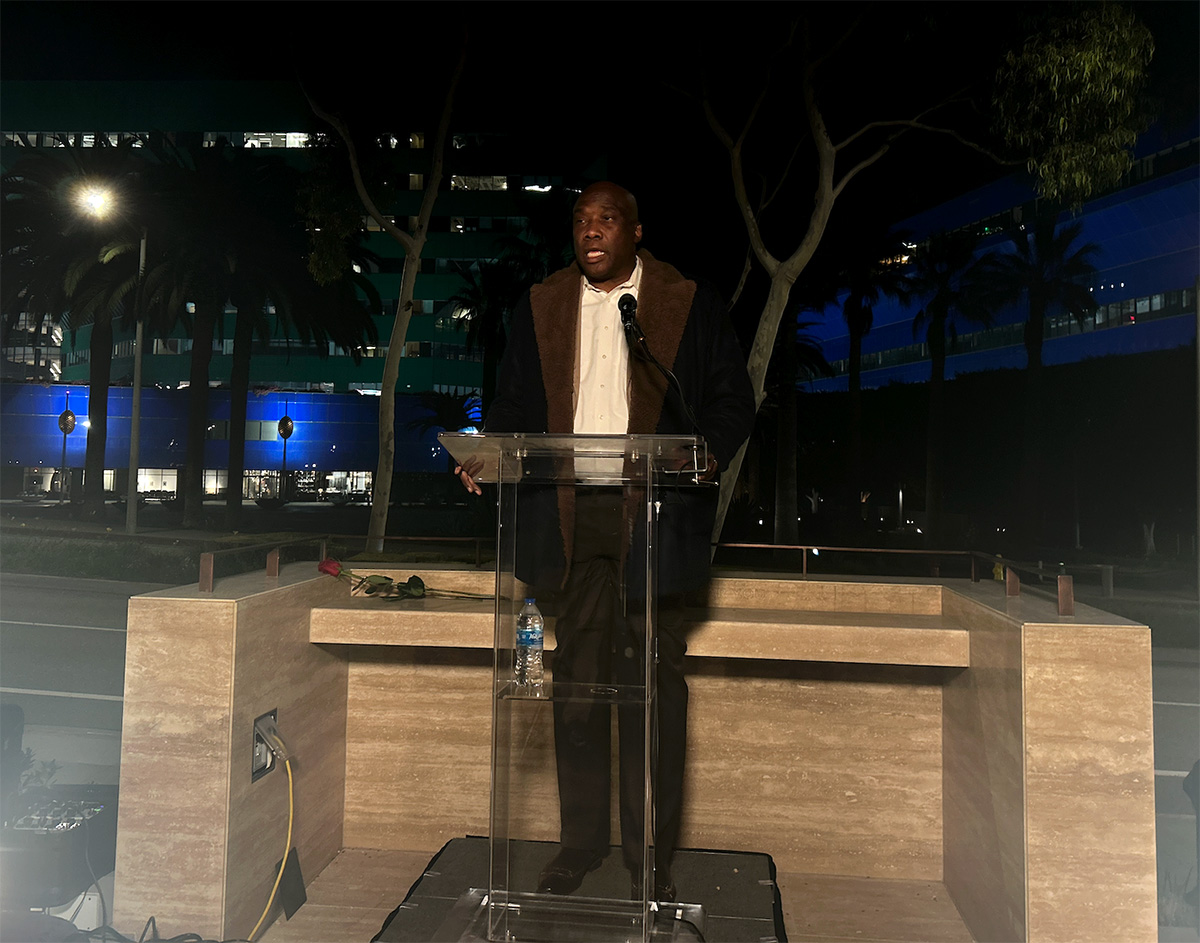
On Monday, the federal administration did not honor World AIDS Day, for the first time since the international awareness day was created in 1988. In addition to significant funding cuts to organizations focusing on HIV preventative treatment and care, the government’s halting of this commemoration perpetuates a dismissive system of inaction against LGBTQ+ people.
And yet, over 50 community members filled the empty spaces of West Hollywood’s AIDS monument yesterday evening, waiting in the night chill as city officials delivered impassioned statements and writers from APLA Health read personal pieces that centered a grief and love for those lost to the epidemic.
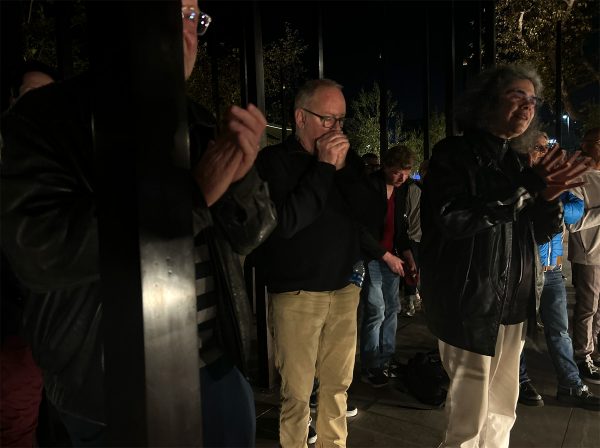
Before the readings began last night, West Hollywood vice mayor John Heilman asked for residents to join him in a righteous rage against administrative apathy. “I want to ask us all to reflect for just a moment about all of the people we lost…I want us to reflect and get angry,” said Heilman. “We have a fucking president who won’t even recognize World AIDS Day.”
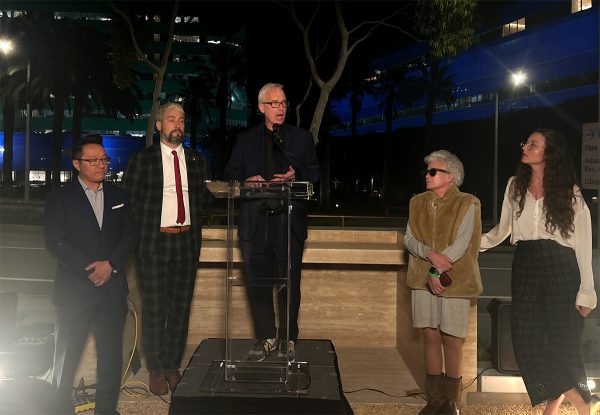
Irwin Rappaport, board chair for STORIES: the AIDS monument, echoed this immense disappointment. “Many of us here tonight lived through the 1980s, so we know what that’s like,” Rappaport said. “We also know that because of that neglect, because of that lack of caring from the federal government, we have to care for one another — and we know how to do that. When we don’t have recognition from others, we know how important it is to preserve our own history, to tell our own stories.”
Through heavy silence, five writers from APLA Health’s writers group stood tall before a podium and shared intimate writings they created about the epidemic and its personal impact on them. The collective was established in 1989 to provide an inclusive, expressive space for HIV-positive writers and allies to work on their writing and learn how to share their stories.
Writer Brian Sonia Wallace, who served as West Hollywood’s poet laureate from 2020 to 2023, has been working with the writers group for the last four years to help them hone and refine their narrative voices as they share their heaviest grief and the depths of their love for the people they lost to HIV and AIDS.
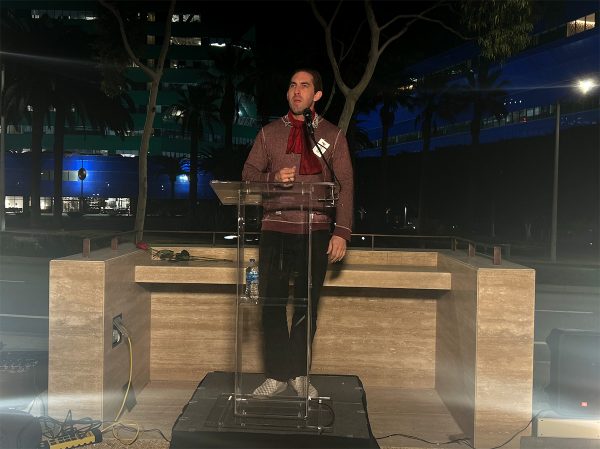
Hank Henderson, one of these writers, read from a diary entry from November 29, 1991. His voice, clear and strong, wavered as he shared about the death of his dear friend Richard. In a piece filled with lush, rich detail, painted clearly with a strong and loving voice, Henderson recounted a memory with Richard during the latter’s last years.
“The Santa Barbara sky is clear blue forever today…Yesterday came and went like a half-remembered dream between snooze alarms,” Henderson recited. “Last year, we walked to the beach. We spent hours there, played frisbee ourselves, brought the dog. Richard even yelled out 30-minute tanning turnover alarms. Yesterday, he took tiny, labored steps back to the car, used my shoulder to keep himself from falling over. Nobody said anything. We just pretend it’s normal.”
Another writer, Austin Nation, shared the story of being told he was HIV-positive at 26 years old. As a young nurse, he remembered the shock of seeing “young, beautiful men” arriving at the hospital covered in “purple, blotchy sores.” When he received his own test results, a paralyzing terror washed over his body. An incredulity followed the fear: why was this happening to him? “I got this thing for what?” Nation spoke. ”For having fun? For making love? And now it’s gonna cost me my life?”
But as he stood before the crowd, now 63 years old, he was met with applause and joy as he stated and repeated: “I’m still here. I’m still here.” The writers, in their grief and loss, have come to a place where they are able to share these stories, empowered and held. “In a world that writes off people with stories like mine,” Nation said. “It’s a hell of a good day to be alive.”
Kristie Song is a California Local News Fellow placed with the Los Angeles Blade. The California Local News Fellowship is a state-funded initiative to support and strengthen local news reporting. Learn more about it at fellowships.journalism.berkeley.edu/cafellows.
West Hollywood
West Hollywood kicks off community-focused programming for World AIDS Day
Since 1988, queer communities have come together on Dec. 1st to honor siblings and allies lost to the AIDS epidemic.
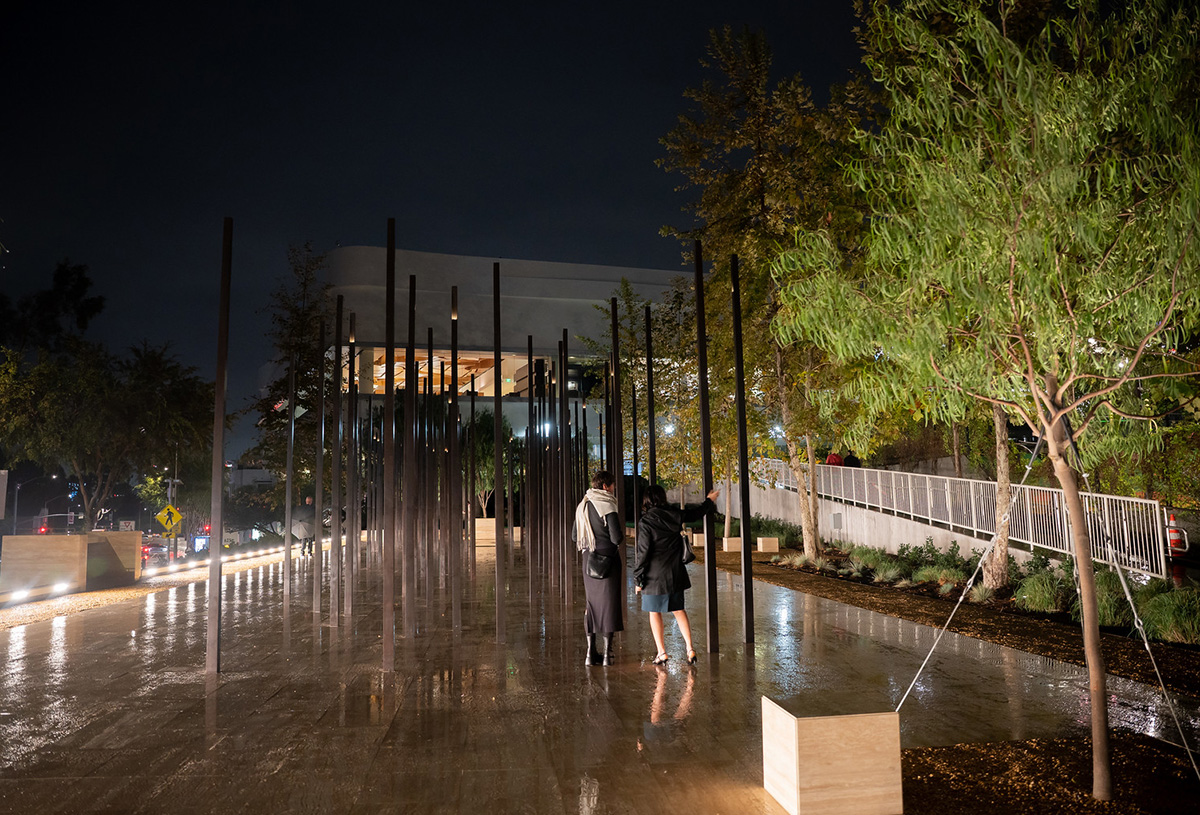
Since 1988, LGBTQ+ communities have come together on Dec. 1st to commemorate queer siblings and allies lost to the AIDS epidemic. This year’s World AIDS Day follows the theme “Overcoming disruption, transforming the AIDS response” and highlights the substantial funding cuts to research, health services, and community initiatives that have prioritized the safety of people with HIV and AIDS. The theme challenges people to think about “radical” ways to organize together and ensure that those who are impacted are able to access the care, treatment, and awareness that they need.
Beginning today, the City of West Hollywood is kicking off programming to recognize the historical transformation that local queer communities experienced during the AIDS epidemic. A panel from the AIDS Memorial Quilt will be available for viewing at the City’s Council Chambers at 625 N. San Vicente Boulevard through Monday, Dec. 15th.
Known as the largest community arts project in history, the Quilt is a powerful memorialization of loved ones who died during the epidemic. Each panel of the Quilt contains a story of remembrance, immortalizing a life cut short during the crisis. The project currently contains over 50,000 panels dedicated to over 110,000 people, all woven together in a 54-ton tapestry piece.
If you’re visiting the panel today, there will be an additional gathering opportunity tonight at the West Hollywood Park for STORIES: the AIDS Monument. From 5:30 to 8:30 p.m., members from the HIV-positive writers collective APLA Health Writers Group will present intimate readings that reflect on their experiences. Community members will be allowed time to wander through the monument and also preview the new Herb Ritts: Allies & Icons exhibition at ONE Gallery after the program. The art show includes striking black and white portraits of activists who stood in alliance with those most impacted during the AIDS epidemic.
Additionally, fresh flowers will be placed on the bronze plaques that line the City’s AIDS Memorial Walk. During the AIDS epidemic, West Hollywood was at the center of a rampant grief and loss that juxtaposed vibrant programming and efforts that boosted healing and fought against stigma and violence. It continues to be a vibrant space that houses various organizations and memorial spots that continue to uphold the revolutionary history and advocacy work that has continued since the epidemic’s beginnings.
Today, West Hollywood is in the process of executing its HIV Zero Strategic Plan, an initiative that began in 2015. Its goals include: expanding healthcare access for people living with HIV and AIDS, reducing the rate of infections, lessening health disparities and inequities for those impacted, and slowing the disease’s progress from advancing to AIDS.
According to West Hollywood mayor Chelsea Byers at a recent Cityhood event, the initiative carries forth the City’s “bold vision” and commitment to ensuring marginalized community members living with HIV do not face the life-threatening discrimination and health barriers that their elders experienced.
To learn more about the City’s programming, read here.
Kristie Song is a California Local News Fellow placed with the Los Angeles Blade. The California Local News Fellowship is a state-funded initiative to support and strengthen local news reporting. Learn more about it at fellowships.journalism.berkeley.edu/cafellows.
West Hollywood
Today, West Hollywood celebrates 41 years of queer cityhood
WeHo’s city officials are trying to preserve the fight for queer safety and rights that began decades before.
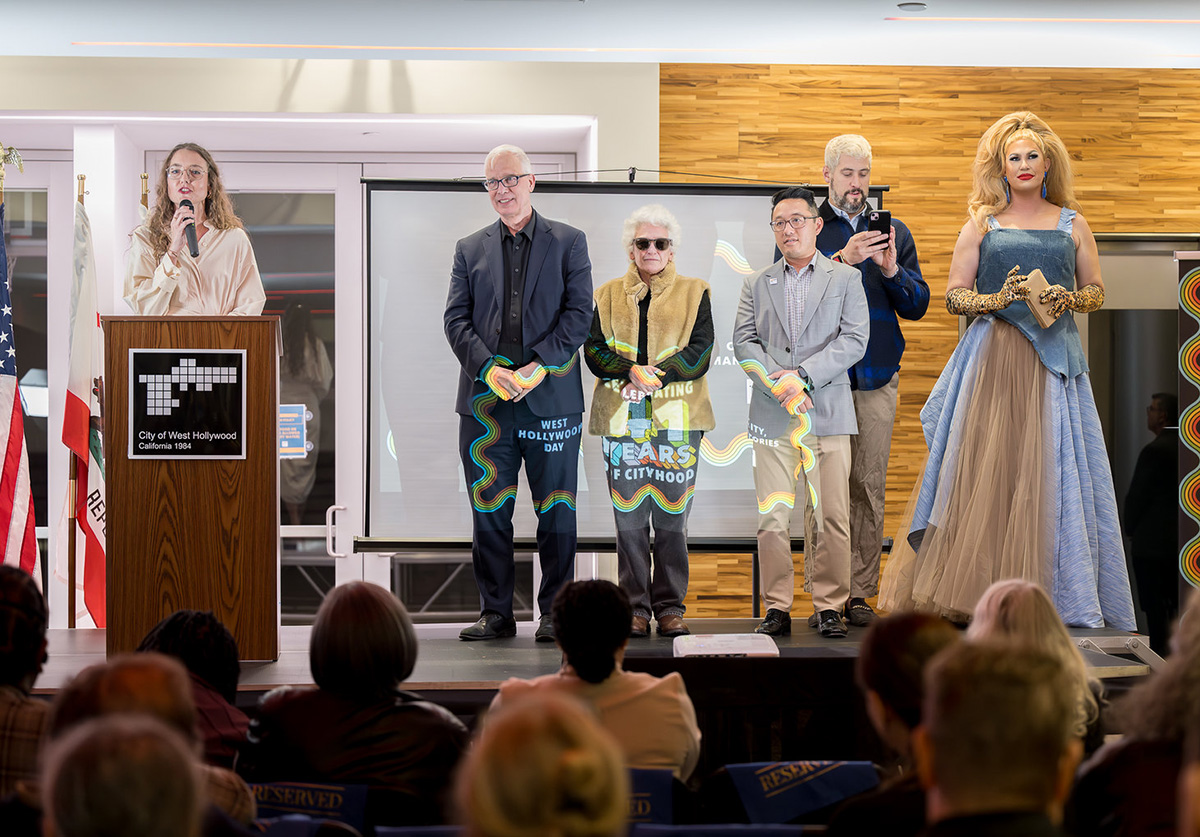
On Nov. 29th, 1984, West Hollywood was incorporated as an independent City, making its sovereignty official and solidifying it further as a sanctuary for LGBTQ+ community members, their stories, and their freedoms. Inspired by other prominent gay neighborhoods like New York’s West Village and San Francisco’s Castro District, West Hollywood was established by local queer advocates and residents. Their first city council was made up of a majority gay governing body — the first in the world, according to the West Hollywood History Center.
This political legacy, and the city’s vibrant and proudly queer history, continues to be preserved. On Monday’s celebratory event, West Hollywood mayor Chelsea Byers announced that the City’s current council “continues to be a majority-LGBTQ+ body,” holding tightly onto a “spirit” that reflects, prioritizes, and fights for Los Angeles’ queer community.
West Hollywood has been through various transformations, cocooning and revitalizing itself through the country’s evolving political and cultural upheavals. It has long been home to a ravishing nightlife that celebrates LGBTQ+ expression, and was a focal point for queer-led liberation and activism in the late 1960s and early 1970s. Trailblazers like Morris Kight led the first gay pride march through West Hollywood’s streets in 1970 and opened the Los Angeles LGBT Center to nourish the City’s robust and blossoming queer communities.
Today, West Hollywood continues to be the place where queer organizers and residents plant roots. Earlier this month, STORIES: the AIDS monument opened up in the City’s park after over a decade of work, shining a light on the legacies of gay activists, artists, historians, and community members who fought to survive as anti-gay stigma led to the erasure of their rights and lives.
As waves of anti-LGBTQ+ hate and violence continue to surge through the country, West Hollywood elected officials aim to continue doing the critical work that began decades before them: the work that protects the ability of queer residents to advocate for themselves, to live with protections and dignity, and to relish in joy. Mayor Byers is inspired by the resilience of the community members who stood together to establish this independent City in 1984. “The people who lived here…wanted a city with strong protections for renters, with progressive policies, and with a local government that would actually reflect and protect the people who call this place home,” said Byers, at the Nov. 24th celebration.
Over 40 years later, these needs have not changed. The way forward? Remembering and fighting for that initial promise and hope. “We are a chorus. We are a tapestry,” said Byers. “We are the product of thousands of people who, for more than four decades, have dared to say: We can build something better here.”
Kristie Song is a California Local News Fellow placed with the Los Angeles Blade. The California Local News Fellowship is a state-funded initiative to support and strengthen local news reporting. Learn more about it at fellowships.journalism.berkeley.edu/cafellows.
West Hollywood
From nickname to reality, the Rainbow District is made official by the City of West Hollywood
The mile along Santa Monica Boulevard from N. Doheny Drive to N. La Cienega Boulevard welcomes residents and visitors to come as they are
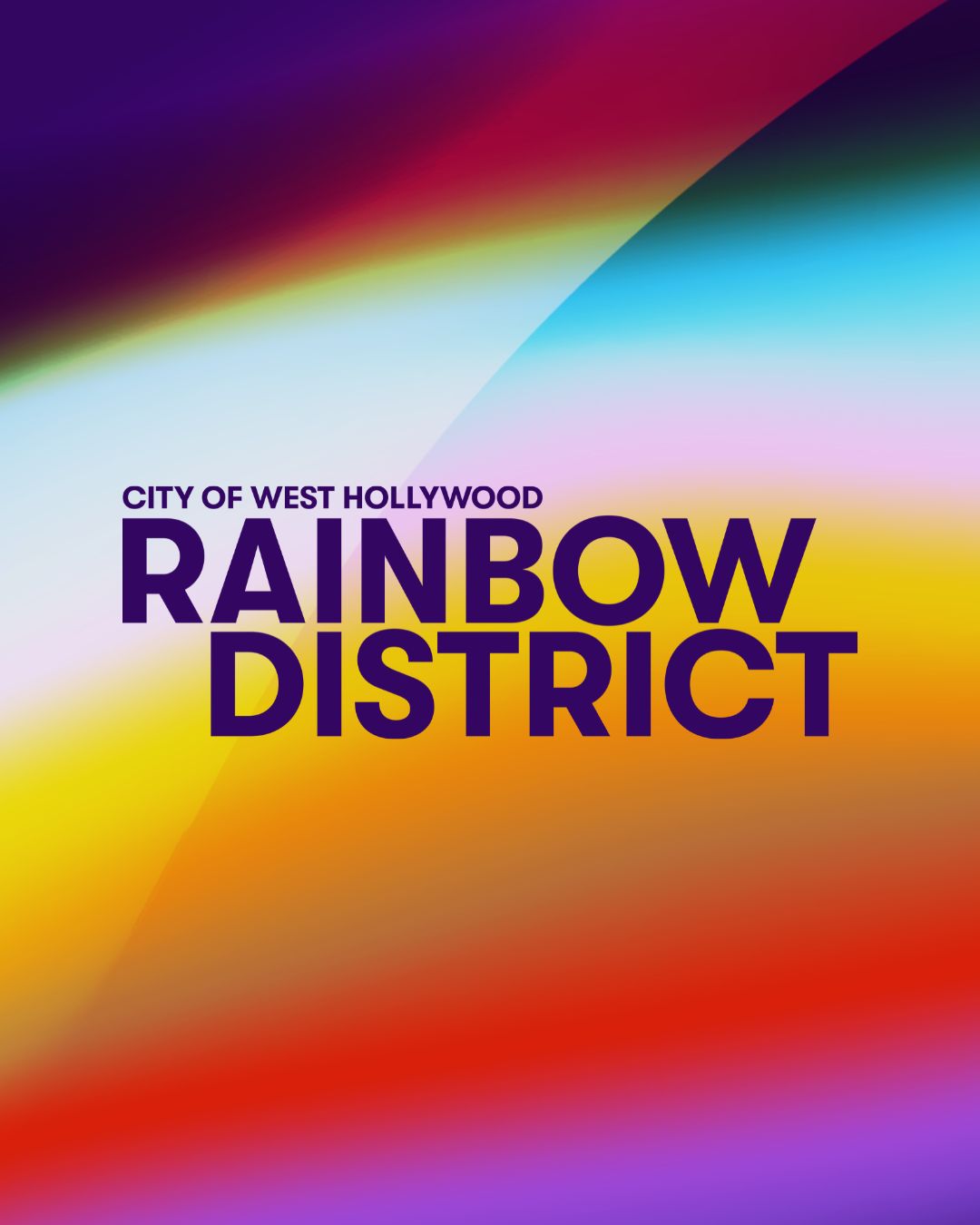
Even in today’s political climate, we will not be hidden.
The vibrant stretch on Santa Monica Blvd of over 50 local businesses, representing the full spectrum of LGBTQ+ expression, from N Doheny Dr to N La Cienega, has had the loving nickname of the Rainbow District for decades. Well, now it’s official. From nightlife to restaurants to community organizations, the City of West Hollywood has formally designated the space as such, honoring the neighborhood’s legacy as a safe haven for the queer community and beyond.
In addition to making the name official, the Rainbow District is being launched with a full range of social media, including Instagram, TikTok, and Facebook, keeping the residents and visitors updated on all upcoming events and happenings in the neighborhood.
Long known as a beacon of acceptance, inclusion, and visibility, where everyone is welcome, this iconic mile-long corridor is now formally recognized for what it has always been: a place where people from every walk of life can come together, be themselves, and celebrate the beauty of diversity.
City of West Hollywood Mayor Chelsea Lee Byers states, “For generations, the City of West Hollywood’s Rainbow District has been a place where LGBTQ+ people take their first steps into living openly, where the warm embrace of community is found at every turn, and where the joy of living out, loud, and proud fills the streets. The City’s official designation of the Rainbow District honors both the legacy and the future of this vibrant neighborhood, home to beloved entertainment venues, bars, and restaurants that have long served as cornerstones of LGBTQ+ life. Today, the Rainbow District is more alive than ever, and it will always stand as a beacon of hope, pride, and belonging and as a reminder that everyone deserves a place to celebrate joy, to be seen, and to be supported.”
The Rainbow District officially joins a nationwide list of iconic LGBTQ+ landmarks. West Hollywood will not be hidden amid political backlash and will continue to protect queer spaces, uplift queer voices, and foster a safe and joyful environment for all.
“This designation is not only a celebration, but it also serves as a promise,” said Visit West Hollywood President & CEO Tom Kiely. “A promise to keep LGBTQ+ spaces visible, valued, and vibrant for generations to come. As the Rainbow District continues to evolve, it will remain a place where locals and visitors alike can connect through culture, creativity, and community. The City’s formal designation affirms its significance and highlights The Rainbow District as the ultimate playground for travelers seeking a unique, inclusive, and authentic experience.”
The Rainbow District will be home to upcoming community events that include:
- Winter Market & Ice Skating Rink — December 2025
- Go-Go Dancer Appreciation Day — March 2026
- Harvey Milk Day — May 22, 2026
- WeHo Pride Weekend & the OUTLOUD Music Festival at WeHo Pride — June 5–7, 2026
Follow the Rainbow District on socials to discover local happenings, support small businesses, and be part of a neighborhood that celebrates every person for exactly who they are.
Instagram: @RainbowDistrictWeHo TikTok: @RainbowDistrictWeHo
Facebook: facebook.com/rainbowdistrictweho More Info: visitwesthollywood.com/rainbowdistrict
West Hollywood
West Hollywood’s AIDS Monument preserves the pain and power of people lost to the crisis
STORIES: The AIDS Monument is now available to view at West Hollywood Park, 15 years after its conception.
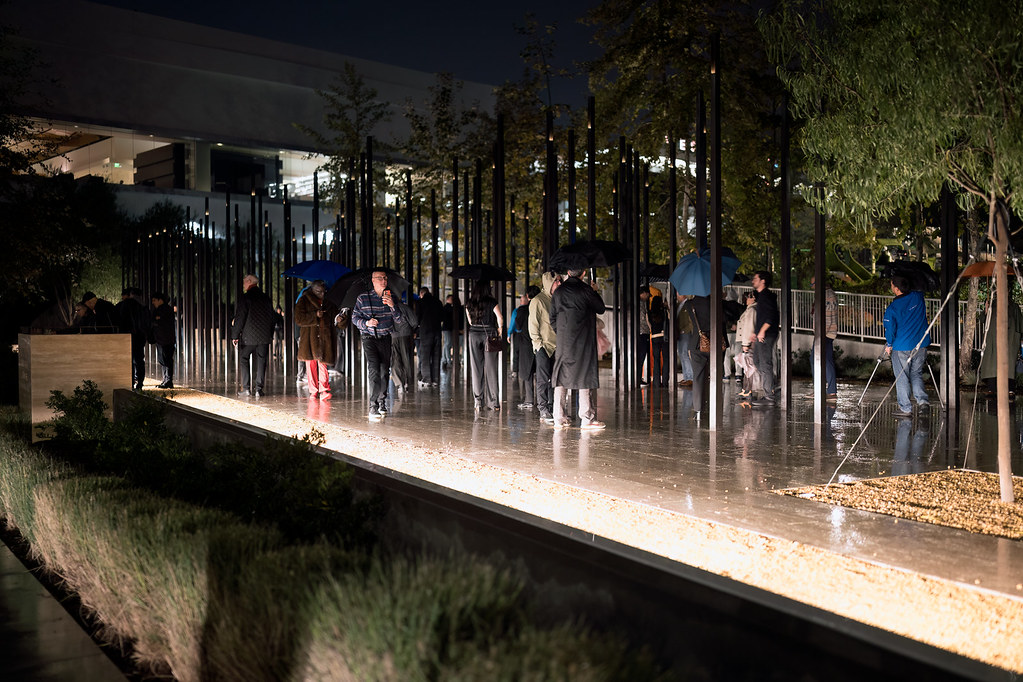
It was 1985, at the height of the AIDS crisis, when Irwin Rappaport came out as gay. As he came to terms with his identity, he witnessed people around him grow weaker: their faces becoming gaunt, painful lesions developing on their bodies. Five years later, he began volunteering as a young lawyer at the Whitman-Walker Clinic, a community health hotspot in Washington, D.C. that created the first AIDS hotline in the city, opened homes for patients with AIDS, and distributed materials that promoted safe sex.
The work being done at the clinic was instrumental, essential, and deeply painful. “When you see that sickness and experience that death among your friends and people you know, and when you’re writing wills for people who are much too young in ordinary times — it has an impact,” Rappaport told the Blade. “And even though in 1996 we saw life-saving medications come around, you never forget the sense of fear that permeates your life. The sense of loss.”
Determined to honor and share the legacies of people who died from AIDS, Rappaport joined the Foundation for the AIDS Monument (FAM) board to work towards the organization’s goal of creating a physical monument dedicated to memorializing these histories. FAM treasurer Craig Dougherty first conceived of this project in 2010 and, after 15 years, STORIES: The AIDS Monument is now available to the public for viewing.
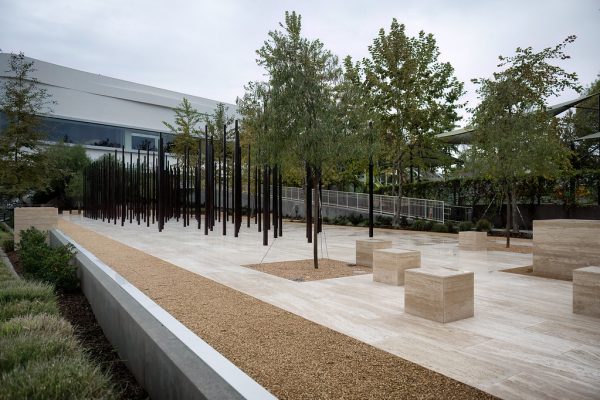
Created in collaboration with the City of West Hollywood, STORIES: The AIDS Monument is composed of 147 vertical bronze pillars known as “traces.” Designed by artist Daniel Tobin, 30 of these traces are engraved with words like: activism, isolation, compassion, and loss, which correlate to the over 125 audio stories collected and archived on the foundation’s website. This multimodal storytelling allows people who come across the monument to engage more intimately with the people represented by these physical pillars.
At nighttime, lights transform the monument into a candlelight vigil, providing a warm glow to a wanderer’s journey through the structure.
When people were able to walk around the traces at Sunday’s grand opening ceremony at the Pacific Design Center, the last remnants of the weekend’s rainstorm created a kind of “spiritual” and reverent atmosphere for those gathering, according to Rappaport. “I think there’s a certain peacefulness and serenity about the design, an opportunity for reflection,” he continued. “For some, it may bring back incredibly painful memories. It might bring back wonderful times with friends who are no longer here. It might remind them of their own caregiving or activism, or the sense of community that they felt in striving with others to get more attention to the disease.”
Now that the monument has been built, FAM has passed the mantle of management and programming to One Institute, a nonprofit that engages community members with queer history through panels, screenings, and other educational initiatives. One Institute plans to host monthly docent tours, art installations, and other special events during various LGBTQ+ national awareness days, including the upcoming World AIDS Day in December.
Rappaport also hopes to do outreach with local schools, so that young students are able to engage with the monument, learn about the people who were affected by the AIDS crisis, and interact with the ripples of transformation that this time period sparked in politics, research, the arts, and within society. “For younger people, I think [this is] an invitation for them to understand how they can organize about issues that they care about,” Rappaport said. “[So] they can see what the HIV and AIDS community did as a model for what they can do to organize and change the world, change culture, change law, change politics, change whatever they think needs to be changed. Because we had no other choice, right?”
West Hollywood
West Hollywood invests $1 million to build LGBTQ+ Olympic hospitality house
Pride House LA/WeHo will be an interactive space for queer athletes and allies to celebrate the 2028 Summer Games together.
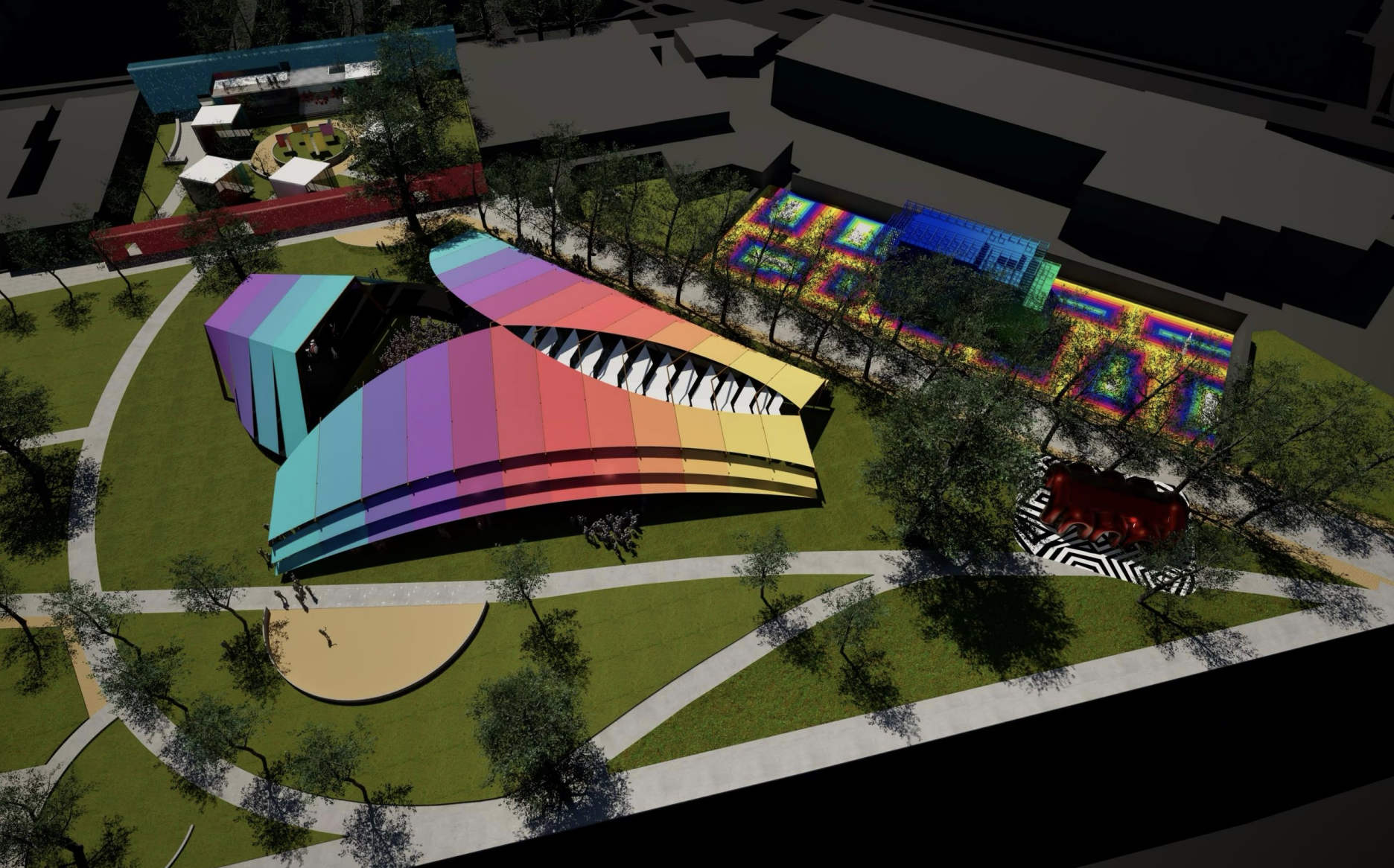
The first-ever Olympic hospitality house began with humble roots in 1992: a tent pitched on the Port of Barcelona for athletes to gather with their families. Since then, they transformed into fixtures of several major sporting events, with hopes of fostering belonging and safety for athletes of various cultural backgrounds.
It wasn’t until 2010 that the first LGBTQ+ hospitality house, the Pride House, appeared during the Winter Olympics in Vancouver. Over the years, its existence and visibility have faced barriers. During the 2014 Sochi Winter Olympic Games in Russia, Pride House International was denied from organizing its safe hub. The rejection was a blow to the visibility and safety that the organization was trying to promote and create for queer athletes. But this didn’t go unnoticed. International fans demonstrated quiet resistance, hosting remote Pride Houses in support of the Olympians who were barred from openly communing and celebrating together.
As Los Angeles prepares to host the Summer Olympics in July 2028, Pride House is coming back stronger than ever. In early October, the West Hollywood city council approved an agreement that would allocate $1 million to sponsor Pride House LA/WeHo as they prepare to build a temporary structure at West Hollywood Park for the 2028 Games. For 17 days, vibrant LGBTQ+ sports programming will fill the park’s grassy knolls.
Pride House LA/WeHo CEO Michael Ferrera detailed at a Nov. 1st Out Athlete Fund fundraising event that the team plans to build a concert stage to seat over 6,000 people. There will also be a museum that will take viewers through 100 years of queer Olympics history, viewing areas for people to watch the games, and a private athlete village for queer Olympians. “The dream of that is — imagine you’re an athlete from a country where you can’t be out,” said Ferrera. “You come here, and you can be safe and sound.”
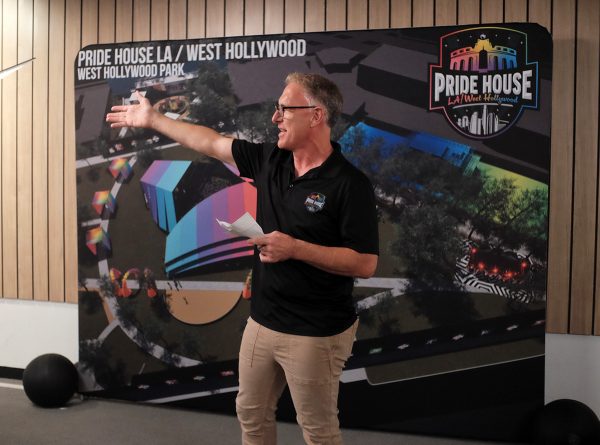
As outlined in the city council agreement and stated by Ferrera, most of the programming will be free and open to the public, and in the heart of a neighborhood that many of the county’s queer residents recognize as their safe haven. “We’re centering this important event in West Hollywood Park where our community has come together for decades in celebration, in protest, to support each other and to live our lives,” Pride House LA/WeHo CEO Michael Ferrera wrote to the Blade. “There is no place that is more representative of inclusion and safe spaces.”
The City of West Hollywood is promoting this inclusion further by asking for local community members to voice their perspectives on the formation of Pride House LA/WeHo at West Hollywood Park. On Monday, a community conversation will take place at Plummer Park to encourage residents to help shape the cultural programming that will take place in the summer of 2028. Another conversation will take place on Nov. 21st at the City’s 40th anniversary of Cityhood event.
“We couldn’t do this without the generosity and partnership of the city of West Hollywood,” Pride House LA/WeHo marketing co-lead Haley Caruso wrote to the Blade. “We are so happy to help bring the Olympic spirit to West Hollywood while also providing the community a safe and entertaining venue to enjoy the Games.”
Head to PrideHouseLAWeho.org for more information
West Hollywood
Drag performers delight Carnaval crowds with demure and daring dances
The Halloween party is one of the most anticipated events for queer Angelenos.
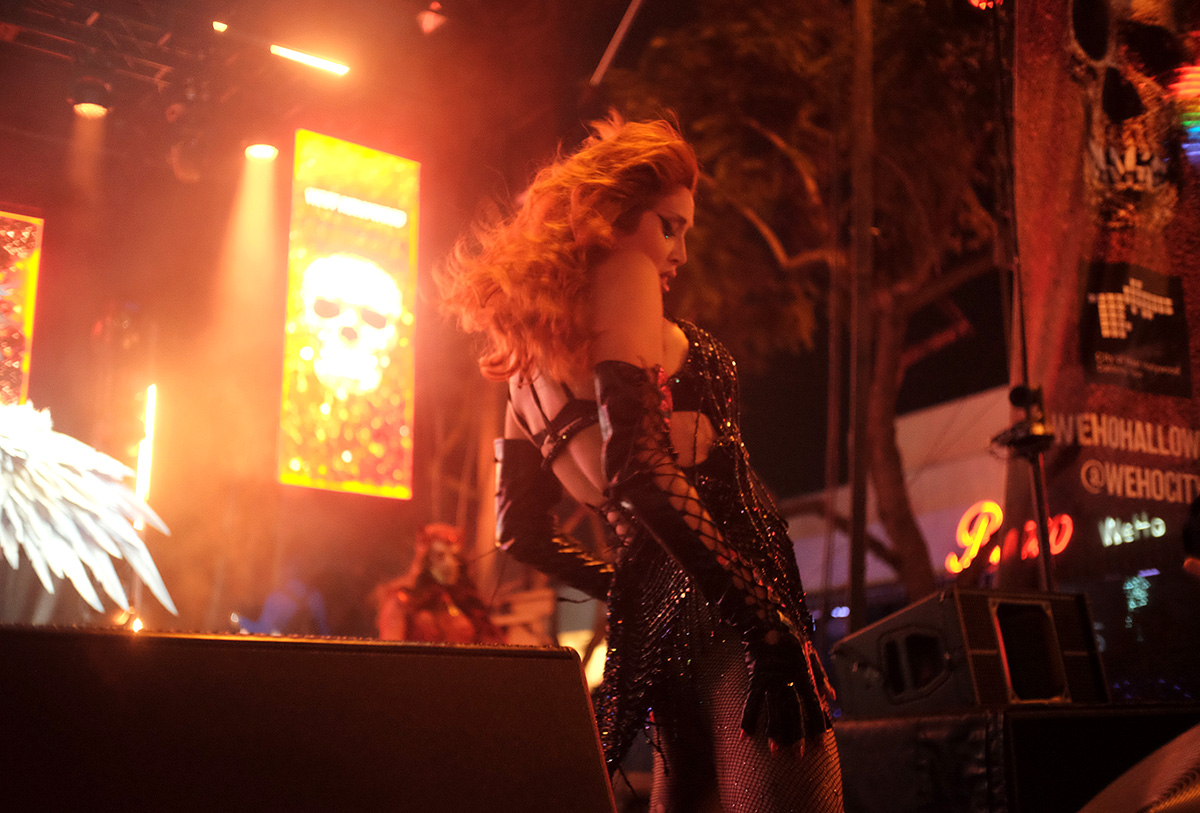
On Friday night, techno pop remixes surged through a tight block on Santa Monica Boulevard, where hundreds of eager partygoers danced near a pop-up stage. Bass-heavy grooves echoed across neighboring streets as Beetlejuices, angels, and vampires swayed and thumped to the beat.
Oct. 31 marked the arrival of West Hollywood’s annual Halloween Carnaval, one of the county’s citywide celebrations — and one of the most anticipated for queer Angelenos.
The first Halloween Carnaval was celebrated in 1987, and has since become one of the most awaited nights for local queer celebration. Drag performers donning elaborate costumes and glamorous makeup set the stage ablaze as they strutted, flipped their hair and danced to the cheers of a crowd that grew enormously as the night went on. The energy was infectious, and the Los Angeles Blade was on the scene to photograph some of these moments.
Image captures by Blade reporter Kristie Song.
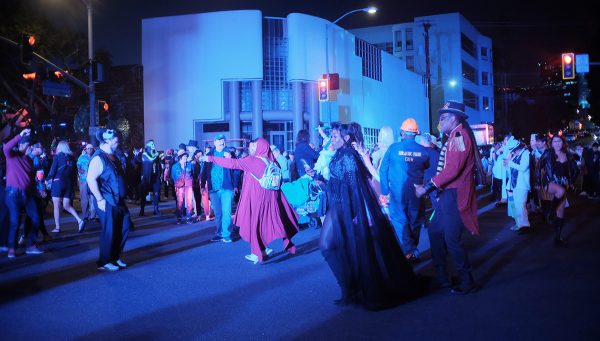
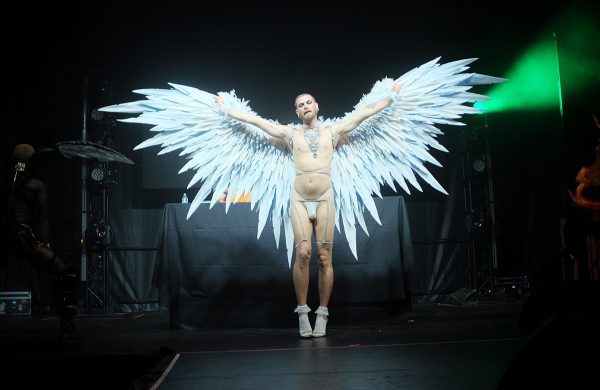
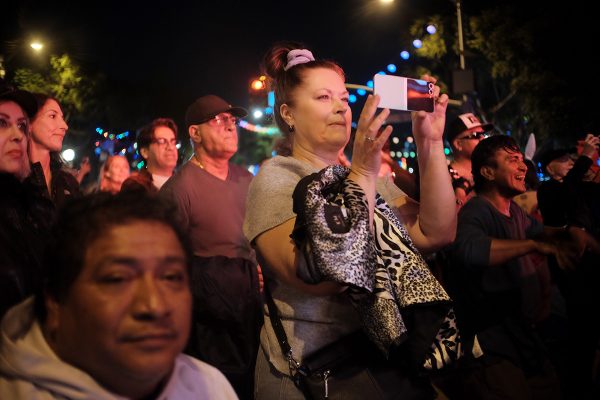
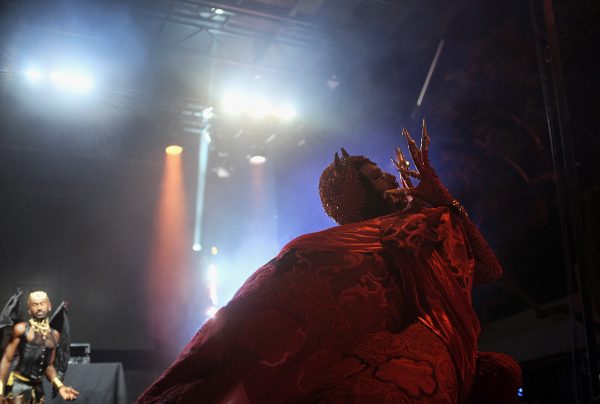
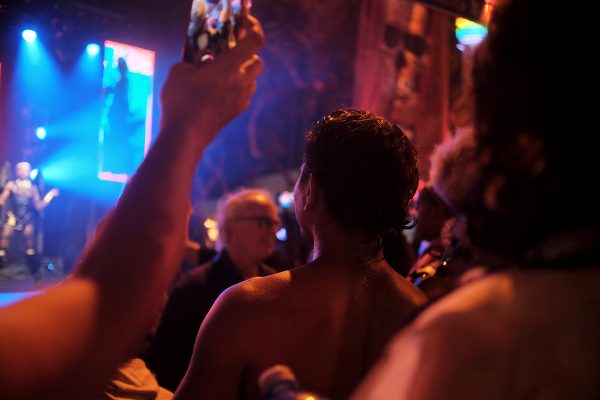
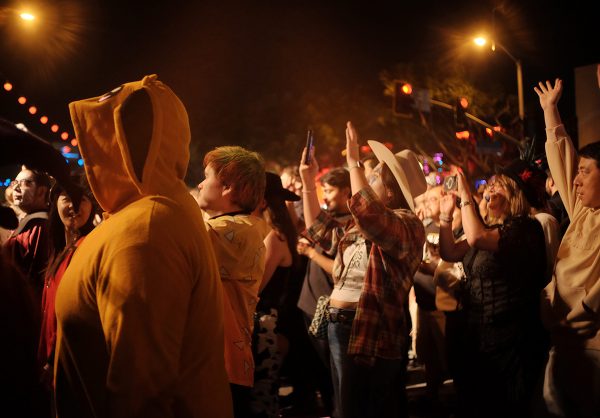
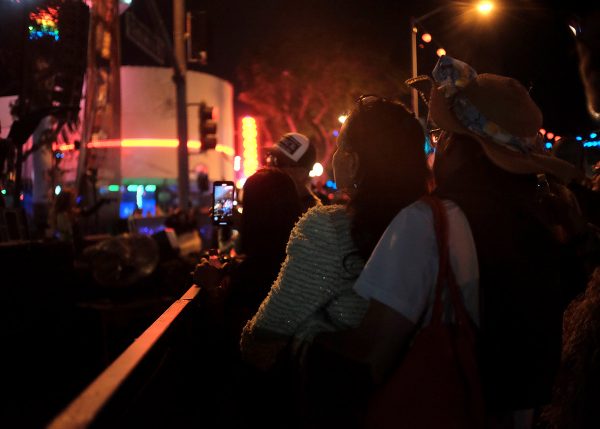
West Hollywood
West Hollywood installs new intersex pride flags on Intersex Awareness Day
On Sunday, city councilmembers gathered to raise two new pride flags to honor intersex community members
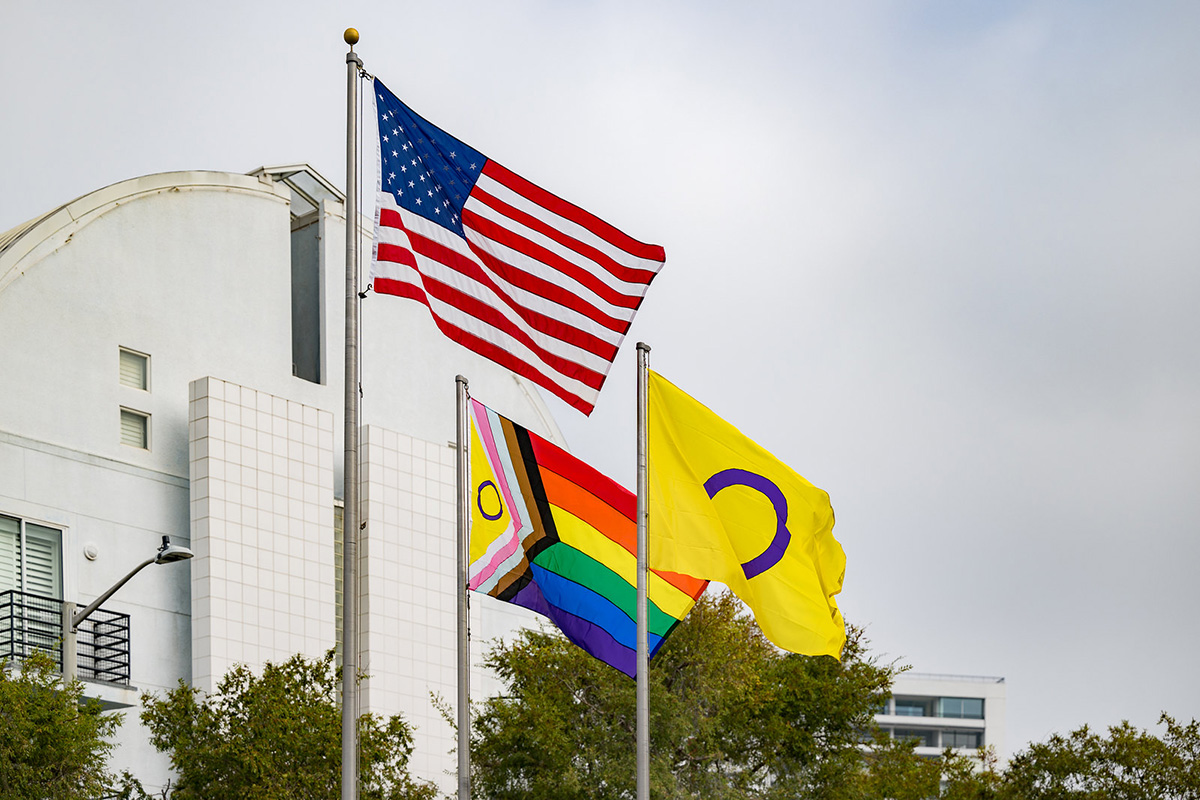
Early yesterday morning, on National Intersex Awareness Day, West Hollywood mayor Chelsea Byers, Vice Mayor John Heilman, as well as councilmembers Danny Hang and John M. Erickson gathered to install and raise two new intersex pride flags. They fly side by side with the American flag, upholding the City of West Hollywood’s vision of solidarity between national pride and LGBTQ+ visibility.
“We are facing unprecedented attacks on our community. It is important that we recognize the entirety of the LGBTQI+ community,” Vice Mayor John Heilman wrote to the Blade. “Intersex people have long been ignored and their issues disregarded. Raising the intersex flag also raises awareness about the challenges many intersex people face.”
Intersex people are born with naturally occurring variations in reproductive and sexual anatomy that don’t fit into binary “male” or “female” categorizations. As Planned Parenthood details, this can look like having both ovarian and testicular tissues or having combinations of chromosomes that aren’t “male” or “female,” just to name a few. According to the Human Rights Campaign Foundation, one of the biggest issues intersex people face is non-consensual surgeries performed when they are children. These operations are considered medically unnecessary and can leave lasting physical and psychological damage on intersex youth.
The fight for bodily autonomy and intersex visibility was the main reason behind the first action organized by intersex advocates and trans allies on Oct. 26th, 1996. Protestors stood outside the Boston Convention Centre, passed out leaflets, and spoke with clinicians, nurses, and other medical professionals attending the annual American Academy of Pediatrics conference.
One of the main leaders behind this movement was Morgan Holmes, an intersex woman who had experienced a violating medical procedure meant to “correct” her anatomy. In May of 1996, she presented testimony in a room adjacent to a symposium on genital surgery for intersex infants, a conference she and other members of her advocacy group had been rejected from.
“What I am saying is that my medical ‘care-givers’ failed to respect my autonomy or my intelligence when they assumed that because I was a child, they could do whatever they wanted as long as my father provided his consent,” Holmes said. “And when I began to balk, instead of questioning their own treatment of me, they blamed my body, and they cut it up.”
Today, intersex people and their stories are more broadly recognized, but still struggle to reach mainstream audiences when it comes to discussions around LGBTQ+ identity. West Hollywood city officials see this addition of intersex pride flags as a step forward. “Updating our city’s flags was my item because visibility matters,” councilmember John M. Erickson wrote to the Blade. “Intersex people have always been part of our story, and it’s time that their history, identity, and pride are recognized in the public spaces that belong to all of us.”
West Hollywood
Residents remain dubious as officials claim “no ICE involvement” at The Abbey
The Oct. 17th “undercover operation” was addressed at the latest city council meeting
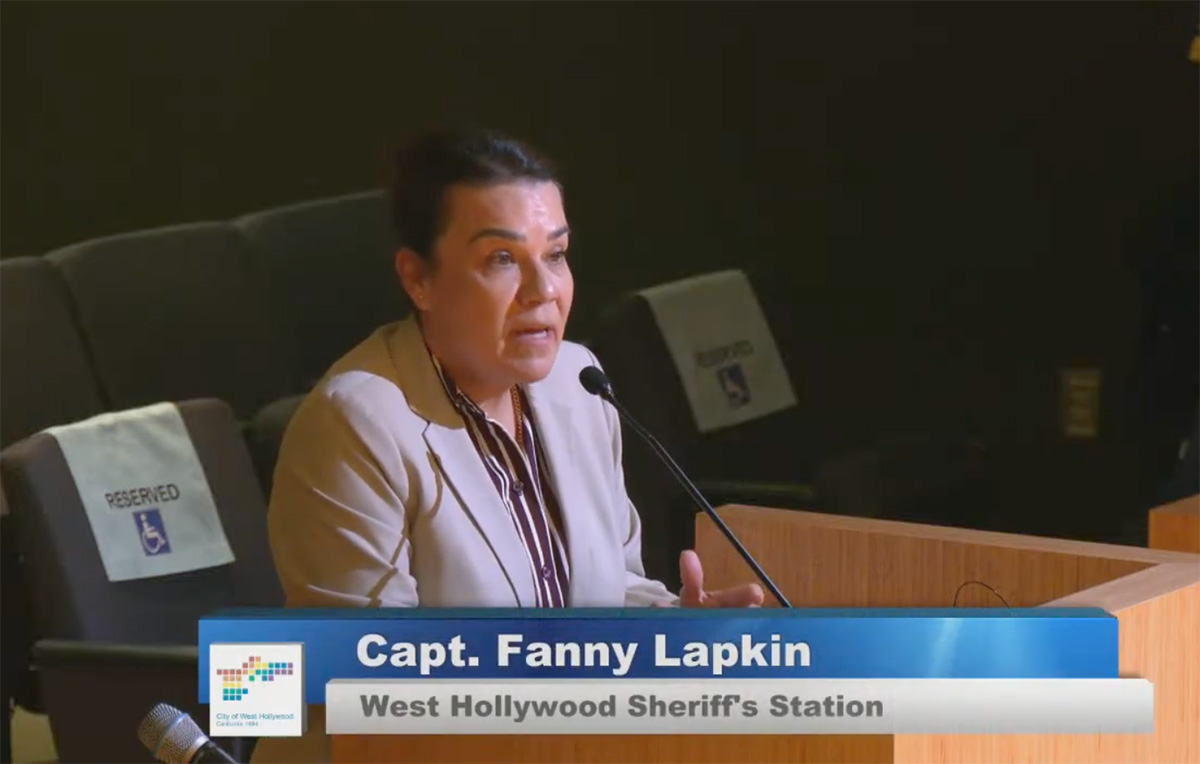
On Friday, Oct. 17th, West Hollywood gay bar The Abbey found itself in the center of a social media storm as clips were shared depicting the presumed presence of federal Immigration and Customs Enforcement (ICE) officers. In a video posted on Oct. 18th by Charles Hernandez, who often creates content around gay nightlife in Los Angeles, several people are seen standing in a line as they are apprehended and handcuffed by officers wearing sheriff’s vests and tees. Hernandez noted that, while dressed in varying attire with the word “sheriff” on it, none of the officers were willing to identify themselves or present their badges upon request.
Hernandez can be heard asking the officers about the cause for arrest, to which one responded: “I don’t have to tell you our cause.” The video creator also questioned another officer, who can be seen wearing a gaiter to cover his face. “Isn’t it illegal to wear a mask in California?” Hernandez asked. “He has COVID,” an officer replied. In September, Governor Newsom signed five bills that weakened federal agents’ abilities to access school sites and health facilities, and prohibited them from hiding their identities. More specifically, SB 627 requires all California law enforcement agencies to create written policies limiting their officers’ use of facial coverings by July 1, 2026.
As this video circulated around the web, the West Hollywood Sheriff’s Station released an online statement of their own, denying allegations that the officers present were federal immigration officers. The station also claimed that the night’s events were a result of an “undercover operation” that was conducted in response to reports made about pickpocketing and the transportation, use, and sale of illegal substances. “Several arrests were made,” the statement read. “ICE was not involved.”
Still, residents remained unconvinced, criticizing the station’s lack of transparency, careful conduct, and accountability. Over 50 people took to the comments of this statement to voice their discontent. “[It] was not that long ago when officers would raid LGBTQ spaces and arrest people simply for being there,” one comment read. “A raid such as this does not inspire feelings of safety for our community. Especially in times when people are being kidnapped off the street by masked federal agents. There simply must be a better response to pickpockets and “other criminal activity” than undercover raids by masked officers and transporting detainees in unmarked vehicles. DO BETTER.”
Two days later, at the West Hollywood city council meeting, West Hollywood Sheriff’s Station Captain Fanny Lapkin took to the podium to address some of these concerns. Echoing the station’s Instagram statement, Lapkin confirmed that the “pre-planned operation” was created in response to “concerns from our businesses and our community in regards to the pickpocketing, to the narcotics, and also to the illegal vending and some of the criminal activity during illegal vending.” Lapkin also confirmed that no federal agents were present, stating that everyone who took part in the operation was “sheriff’s department personnel.” And because the arrests were made as part of a planned operation, Lapkin further stated that warrants were not “necessary.”
The events were discussed with brevity at the meeting, but community ire has not been dispelled. Several people continue to question the ethics of this undercover operation: Why were the individuals being arrested not clearly told the reason for their detainment? Why were unmarked vehicles present? Why conduct the operation in this way, as Los Angeles neighborhoods continue to stay on high alert over immigration raids? These questions remain unanswered as more specifics about the operation have yet to be released.
-
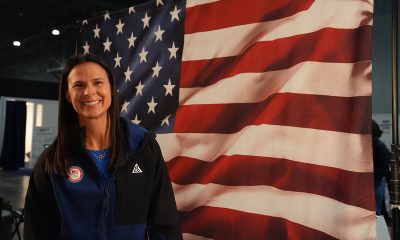
 Sports4 days ago
Sports4 days agoOut Athlete Fund is supporting 6 queer athletes on their way to the 2026 Winter Olympics
-
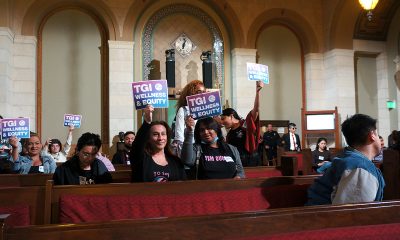
 Los Angeles4 days ago
Los Angeles4 days agoCommunity members urge city council to invest in trans lives
-

 a&e features4 days ago
a&e features4 days agoAlexander Skarsgård describes ‘Pillion’ in 3 words: lube, sweat, leather
-

 a&e features5 days ago
a&e features5 days ago“I just kept showing up”: Broadway veteran Marc Shaiman reflects on musical success stories
-
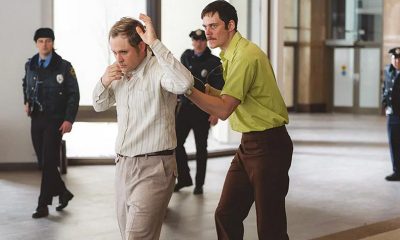
 Movies5 days ago
Movies5 days agoVan Sant returns with gripping ‘Dead Man’s Wire’
-
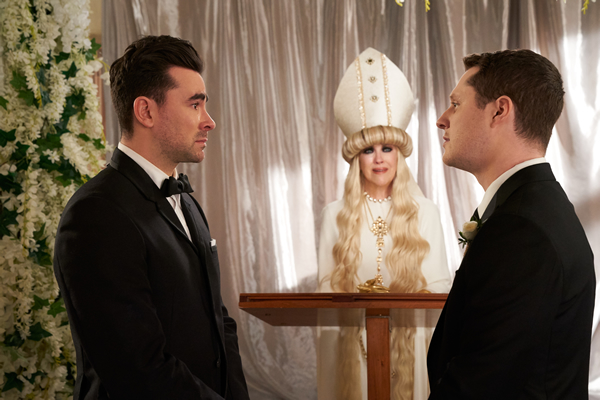
 Obituary3 days ago
Obituary3 days agoCatherine O’Hara, ‘Schitt’s Creek’ star and celebrated queer ally, dies at 71
-
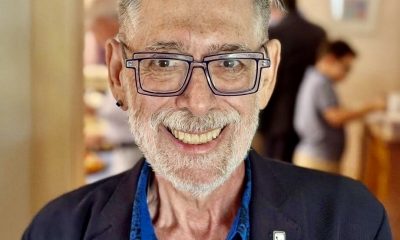
 Features2 days ago
Features2 days agoLGBTQ+ legal hero Jon Davidson hands civil rights torch to new generation
-

 Television17 hours ago
Television17 hours agoSay ‘Hello, Hello, Hello’ to ‘Drag Race’ winner Onya Nurve
-
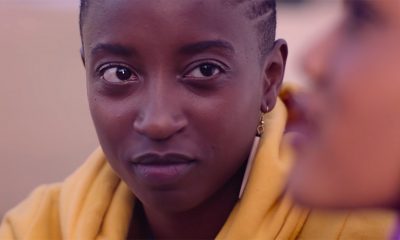
 Film2 days ago
Film2 days agoRevolutionary lesbian film “Rafiki” secures victory in fight against censorship in Kenya
-

 Commentary18 hours ago
Commentary18 hours agoAre we addicted to yearning?

